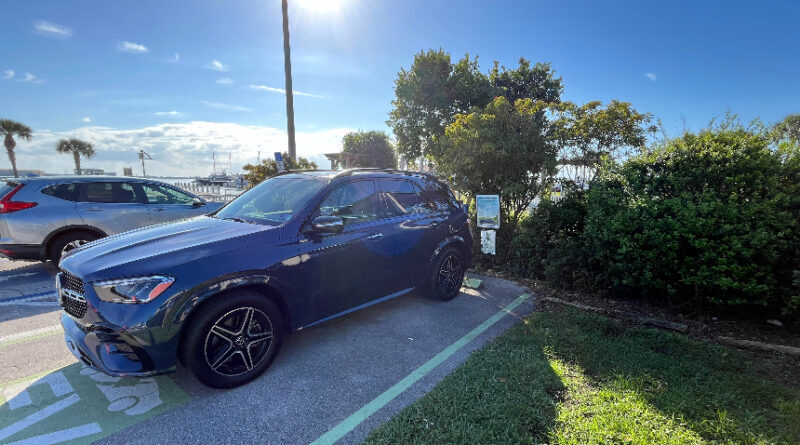Last Updated on: 7th June 2025, 10:50 pm
As the failed president of the United States flounders his way through a second term, the tariff situation he has created is threatening to cause serious financial harm to the auto industry — which is more global than the current occupant seems capable of understanding. Shockingly, it seems that several German automakers actually manufacture automobiles in the US and export them to global markets. This actually creates jobs for Americans in America and contributes a lot of money to local economies.
One of those companies is Mercedes-Benz, which has now withdrawn earnings guidance for 2025 because of the uncertainty surrounding tariffs. During his first term, the so-called president crowed that tariffs wars were easy to win. He may believe that, but actual experience has proven otherwise. Mercedes says now that if auto tariffs remain at their current levels, it would decrease the company’s profit margins by 300 basis points on cars and 100 basis points on vans. 100 basis points is equal to 1 percent.
This week, Mercedes CEO Ola Källenius told Germany’s Der Spiegel in an interview that while he is looking at different scenarios, the kind of investments he has to make are ones that could last for decades, rather than ones made “in response to a volatile situation” such as the current US–EU tariff situation. He added the current US administration seems to believe “that we in Europe are closed to certain issues and only demand openness where we have strength.” That interview was translated and republished by Autoblog.
Kallenius told Der Spiegel he thinks he has an idea that would resolve the trade and tariff dispute. What he suggests is that cars made in the US would be allowed into the EU tariff free. In return, an equal number of cars made in Europe would be allowed into the US duty free as well. “For every car that leaves the USA or Europe, a car from the other side comes in duty-free,” Källenius told Der Spiegel. “We have put this idea to both sides, and it is a possible component of the negotiations between the USA and the EU.”
Källenius was at pains to point out that Mercedes “is a major producer” of cars in the United States. In fact. it manufacturers about 350,000 vehicles in the US. They include the GLE SUV, a coupe, the GLS SUV, the Mercedes–Maybach GLS SUV, the EQS SUV and sedan, the EQE, and the C-Class sedan. “But the models we build and sell [in the US] are not the same. Two-thirds of the vehicles from our plant in Tuscaloosa, Alabama, are exported to 150 countries worldwide. We therefore contribute to a more balanced trade balance for the USA. We believe this should be taken into account in the tariff negotiations.”
Great minds run in great circles, they say, so it is no surprise that Ford CEO Jim Farley is on basically the same wavelength as Kallenius. He thinks Ford should get credit for building cars in the United States that are exported, calling it “essential” that the federal government come up with policies that encourage manufacturers to build cars for export. Ford, he noted, exports nearly as many vehicles as it imports. “So many of the vehicles we build here are exported around the globe. Shouldn’t we get credit for that?” Farley asked.
BMW And The Tariff Wars
Autoblog adds that BMW also has a significant export business for vehicles it manufacturers in the United States. Some of its best selling models, including the X3, X4, X5, X6, X7, and XM, are assembled in Spartanburg, South Carolina — home to BMW’s largest factory, which serves both US and international markets. According to data from the Department of Commerce, BMW is the largest automotive exporter by value in the country. In 2024, it exported “more than $10 billion” worth of cars that were manufactured in the US.

This week, Greg Kable, writing for Ward’s Auto, reported that BMW has decided to build several of it’s latest battery electric cars in the US. It is expanding its Spartanburg factory and plans to produce the BEV version of the X5 there beginning next year, with the BEV version of the X7 to follow in 2027 and the iX6 in 2028. It is investing $1 billion in the factory expansion and another $700 million in a new battery factory in nearby Woodruff, South Carolina. The new battery factory will supply sixth-generation battery packs developed in partnership with Envision AESC using locally sourced materials wherever possible.
Those electric cars made in Spartanburg will continue to use the company’s CLAR platform, which permits the company to hedge its bets by installing either conventional internal combustion or battery electric powertrains. A few years ago, we would have said that was silly. Just follow Tesla’s lead and make electric cars on dedicated electric car platforms. In hindsight, what BMW and many other manufacturers are doing is allowing them to adapt to new market realities. The electric variant of the X5 will be known as the iX5 and will be launched alongside gasoline, diesel, and plug-in hybrid versions of that car.
The electric cars built in South Carolina will incorporate some of the innovations baked into the company’s Neue Klasse EVs, including 800V electric architecture that uses sixth-generation cylindrical battery cells. They will also showcase a new digital cockpit with a panoramic head-up display system. The battery upgrades will result in 20 percent higher energy density, a 30 percent increase in both range and charging speed, and a 40 percent reduction in energy loss. A flagship iX7 with more than 800 hp is planned, while a 900 horsepower ALPINA-tuned version is reported to be in development.
“The introduction of the iX5 and iX7 signal a deliberate evolution rather than a sudden break from existing model lines. Both are conceived to provide continuity in design and practicality for existing customers while incorporating BMW’s latest electric-vehicle technology,” Ward’s Auto says.
The Takeaway
It may come as a surprise to some how many US-made cars are exported. It’s something most of us are unaware of. It’s probably a surprise to the so-called president, too. The argument Ola Kallenius makes is calm and rational, as you might expect from the leader of a major German corporation. What he fails to understand, however, is that the current occupant of the Offal Office is not interested in logic. He is motivated by the desire to get as many people as possible to “kiss my ass,” as he has so delicately stated in public.
With that attitude, the fake tariff war will likely drag on for months or even years, inflicting billions of dollars of losses on everyone who gets caught up in the fray. Above all else, business values stable rules and predictable financial results. Good luck with that for the next three years and 7 months.

Sign up for CleanTechnica’s Weekly Substack for Zach and Scott’s in-depth analyses and high level summaries, sign up for our daily newsletter, and follow us on Google News!


Whether you have solar power or not, please complete our latest solar power survey.
Have a tip for CleanTechnica? Want to advertise? Want to suggest a guest for our CleanTech Talk podcast? Contact us here.
Sign up for our daily newsletter for 15 new cleantech stories a day. Or sign up for our weekly one on top stories of the week if daily is too frequent.
CleanTechnica uses affiliate links. See our policy here.
CleanTechnica’s Comment Policy

